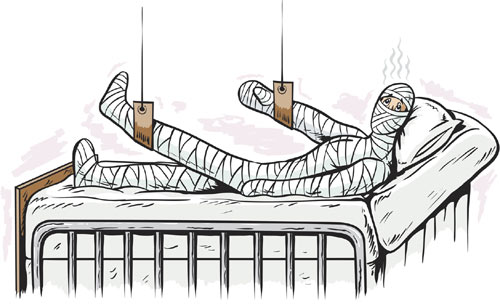 Last week, we shared a question based on a real-life scenario described by a Notary. The Notary was asked to perform a notarization, only to find out that the signer was completely immobilized and unable to write, make a mark or speak. The only motion the signer could make was to nod his head “yes” or “no.” The Notary was unsure whether to proceed with the notarization.
Last week, we shared a question based on a real-life scenario described by a Notary. The Notary was asked to perform a notarization, only to find out that the signer was completely immobilized and unable to write, make a mark or speak. The only motion the signer could make was to nod his head “yes” or “no.” The Notary was unsure whether to proceed with the notarization.
What Notaries said
Several Notaries said that the first thing they would do is to ask if someone had been granted power of attorney to sign on behalf of the immobilized individual.
“I would first see if they have a POA (Power Of Attorney) document in place that supports that a different person is able to act for him if he were incapacitated or heavily medicated,” said Angie Gallegos. “If there aren’t any documents, then unfortunately I wouldn’t notarize.”
Patti Heberling and Becki Wheeler proposed that the signer could hold the pen in his mouth in order to make a signature by mark as an alternative to signing by hand. Heberling said she would first ask everyone else to leave the room so she could speak to the signer privately and determine his awareness and willingness to use this option.
Jorge Maria Perez suggested first determining if the signer is alert and can communicate clearly, then offering the option of a signature by proxy, where the Notary or third party would sign the document at the direction of the immobilized signer. “If he wants me to sign on his behalf, of course I will only do it in the disabled person’s presence and two other witnesses that do not have any interest in the document being notarized,” said Perez, who is a Notary in a state that allows Notaries to sign for persons with a physical disability.
Some Notaries felt it was too risky to proceed with the notarization because of the challenges due to the signer’s physical condition. “If the signer is unable to speak or give his signature, I would not notarize, but advise them to seek a lawyer’s assistance,” said Evelyn K. Graham. “As a Notary, I would not feel comfortable in this situation, even if the signer could blink once for ‘yes’ and twice for ‘no.’ Too much fraud in our world today.”
Standards of Notary practice for an immobilized signer
This was an unusual case because the Notary who left a message for the NNA Communications Team describing the issue did not leave her contact information and state. Consequently we were unable to find out how she ultimately resolved this situation. However, no matter what state you are in, you must first establish if the signer is alert and can clearly communicate before proceeding. This may be difficult for Notaries to judge without medical training or experience working with health care patients. As Patti Heberling suggested, the Notary may wish to ask all other persons to leave the room to see if clear communication can be established with the signer. But if the Notary has any doubts at all — for example, if the Notary observes the signer making involuntary head movements or eye movements that suggest they cannot control nodding or blinking in response to the Notary’s questions — then stop the notarization and go no further.
If you are satisfied that the signer is alert and can clearly communicate, the options available to perform this kind of notarization depend a great deal on your state’s Notary laws. As several of our readers pointed out, the Notary could ask if there is someone available who has power of attorney to sign documents on behalf of the immobilized person as attorney in fact. If so, the attorney in fact could sign any required documents, and the Notary could then notarize the attorney in fact’s signature. In California, this would be the only option available if the immobilized signer is incapable of making a mark. Some states, such as Hawaii, require the attorney in fact to provide proof of their power of attorney to the Notary. Others, such as Kansas and North Carolina, do not require the Notary to verify a signer’s power of attorney.
Some states, including Colorado, Florida and Texas, allow an option known as signature by proxy where another individual may sign a document at the direction of a disabled individual. If this option is chosen, be sure to follow all relevant state Notary requirements. For example, Colorado prohibits Notaries from acting as the proxy signer. Florida and Texas require the Notary to sign. Also, some states require the disabled signer to direct the proxy to sign the document in the presence of one or more witnesses. If the signer in this scenario was unable to direct a proxy due to his inability to speak or communicate, then a signature by proxy could not be used.
Dealing with a signer who cannot write, make a mark or verbally communicate is a very challenging situation. If you encounter this scenario and you have any doubts about the signer’s willingness or ability to communicate, do not proceed with the notarization.
David Thun is the Assistant Managing Editor with the National Notary Association.
Related Articles:
Notary Tip: How to be prepared for signers with special needs
Notary Basics: Determining a signer’s willingness
Additional Resources:
NNA Hotline